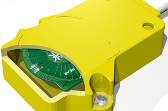CAM204
The CAM204 is a single-chip non-contact position sensor IC for resonant inductive position sensing.
Features
- Resonant inductive position sensing engine
- Fully ratiometric measurements
- SPI communications (slave device)
- User IOs for position triggers and sample indicators
- Measures up to 4 sensors
- Can drive external DAC for up to 4 analog outputs
- Internal software upgradable over SPI
Performance
- Noise Free Resolution 10…16 bits at typical gap, depending on sensor
- Automatic tuning to resonators across ±7% frequency range
- < ±0.1% position change across temperature
- Update rate > 1000 samples/s (Type 1 sensors)
- Single 2.7…3.6V supply
- -40°C to +125°C (CAM204BE)
Fabless sensing chip firm CambridgeIC is providing the technology behind Turck’s latest angle sensor family, its Ri Series.
‘Resonant inductive position sensing’ is CambridgeIC’s fundamental technology, which is implemented inside its chip, the CAM204 – announced at Electronica late last year.
The sensor element is a PCB with tracks defining three coils – one for excitation, and two sensor coils which connect to the chip.
This measures displacement or angle compared with a moving target, which consists of a passive LC resonant circuit – a ferrite-cored coil connected to a capacitor, for example.
“The technology is a high-tech version of the older resolver, synchro and RVDT technologies,” said CambridgeIC. “A coil and capacitor form a simple electrical resonator which replaces the stator. Using a resonant circuit means large signal levels even at big gaps, so that the sensor can be housed behind a thick plastic housing.”
Compared with sensors that detect a magnet’s angle using Hall effect or magnetoresistive sensor elements, claims the firm, its system is tolerant of magnetic fields experienced near drives, motors and electrical welders. And no alignment bearings are required because the technology is tolerant of some misalignment.
For more read: CambridgeIC gets design win Start-up


